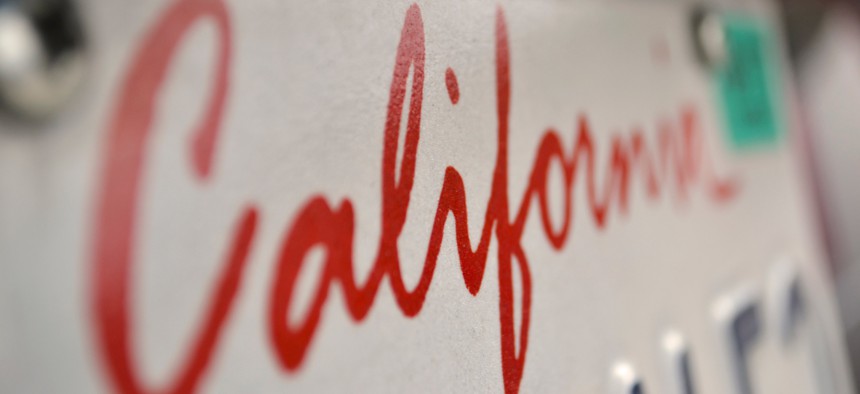State's Denial of Custom License Plate Triggers Free Speech Lawsuit

Shutterstock

Connecting state and local government leaders
At issue is the phrase “come on you whites,” an English soccer team motto California's DMV says has possible racial connotations.
A professor who specializes in constitutional law and First Amendment issues is suing California's Department of Motor Vehicles over its denial of his request for a custom license plate with a soccer team motto, which the agency deemed too controversial to display.
Jonathan Kotler requested a plate with the letters “COYW,” short for “Come on You Whites.” That phrase is a slogan for England’s Fulham Football Club, a team that wears white jerseys and that Kotler says he has supported for years.
Kotler is an attorney and a professor at the University of Southern California’s school for communication and journalism. He has previously argued cases before the U.S. Supreme Court and has served as legal counsel to the California First Amendment Coalition.
The California DMV denied Kotler’s plate request last June. In a letter, the agency said it was unable to approve the plate because it “carries connotations offensive to good taste and decency.”
Kotler filed an appeal over that initial decision, attaching materials like copies of game programs, social media, and images of other items that refer to the team as “the whites,” or that featured the slogan “Come on You Whites,” or the abbreviated “COYW” version of the saying.
“Any subsequent proceedings will provide a real world example for my students at USC of what freedom of speech entails and how it must be defended every day in the face of state action attempting to deny it,” Kotler added in his appeal letter.
The department was unswayed and stuck with its original position. In a July letter, it stated in part: “the configuration is unacceptable. ‘Come On You Whites’ can have racial connotations.”
The department’s letter went on to cite language in state regulations that says a proposed plate design can be denied if it, among other things, includes vulgarity; terms of contempt, prejudice, or hostility; or terms that are insulting, or racially or ethnically degrading.
In a nine-page complaint filed earlier this week in the U.S. District Court for the Central District of California, Kotler’s attorneys with the Pacific Legal Foundation argue the department’s decision to reject the license plate violates his First Amendment right to free speech.
“There is no evidence that the slogan carries racial connotations, and thus no reason that Mr. Kotler should not be able to express his message the same way that thousands of other Americans express their messages on personalized license plates,” the complaint says.
It also charges that the state’s regulations don’t specify who decides whether a proposed license plate is acceptable, and don’t set clear guidelines for this decision making process.
The regulations, the complaint adds, impose “a vague ban on ‘connotations offensive to good taste and decency,’” and allows DMV decision-makers to discriminate on the basis of viewpoint.
Marty Greenstein, a spokesman for the department, said in an email on Friday that it does not comment on pending litigation. He says the agency in 2018 received 249,125 personalized license plate requests. It rejected 31,745. Four people work reviewing applications.
The program has been around since 1970 and money from it goes to support environmental initiatives in the state, according to Greenstein, who said California's DMV collected $59.3 million from personalized license plate fees during the past fiscal year.
Past Supreme Court Cases
Previous free speech cases involving license plates have made it to the U.S. Supreme Court.
The high court in 2015 sided with Texas, over a division of the Sons of Confederate Veterans, after the group sued the state, citing free speech violations, for denying a proposed license plate design that featured a Confederate battle flag.
In that 5-4 ruling, the court held that Texas’s specialty license plates are a form of government speech and that therefore the state could refuse the proposed design.
Justice Stephen Breyer wrote in the majority opinion that, just as the state cannot compel a private party to express a view the party disagrees with, Sons of Confederate Veterans could not force the state to include the battle flag on a license plate.
“When government speaks, it is not barred by the Free Speech Clause from determining the content of what it says,” Breyer added.
Justice Samuel Alito, in a dissenting opinion, said the court’s ruling passed off private speech as government speech and said doing so “establishes a precedent that threatens private speech that government finds displeasing.”
In an earlier case, Wooley v. Maynard, the Supreme Court ruled in 1977 a state could not force someone to display a message on a license plate.
George and Maxine Maynard, a married couple and followers of the Jehovah's Witnesses faith, in 1974 began covering up the “Live Free or Die” state motto on their New Hampshire license plates because they said it was at odds with their moral, religious and political beliefs.
New Hampshire law made it a misdemeanor to knowingly obscure portions of the state’s license plates and George Maynard was cited on multiple occasions for covering up the saying, spending 15 days in jail after refusing to pay fines after his second infraction.
The Supreme Court ruled that by requiring people to display the motto, New Hampshire had invaded “the sphere of intellect and spirit which it is the purpose of the First Amendment.”
“Where the State's interest is to disseminate an ideology,” wrote then Chief Justice Warren Burger, “no matter how acceptable to some, such interest cannot outweigh an individual's First Amendment right to avoid becoming the courier for such message.”
Bill Lucia is a Senior Reporter for Route Fifty and is based in Olympia, Washington.

NEXT STORY: 'Phone Addicts' Are the New Drunk Drivers, Report Says





